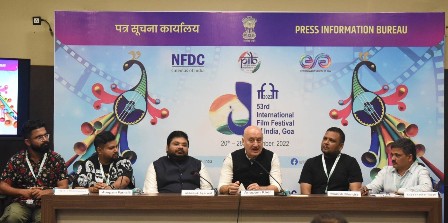The Kashmir Files Documented a True Tragedy
The Kashmir Files started a healing process for Kashmiri Pandits by documenting their tragedy: Anupam Kher.
Krishna Pandit is a young Kashmiri Pandit refugee living with his grandfather, who witnessed the 1990 genocide of Kashmiri Pandits and had to flee from Kashmir. Pushkarnath Pandit fought for the revocation of Article 370 all his life. Krishna believes his parents died in an accident in Kashmir. Krishna Pandit, a JNU student under the influence of his mentor Professor Radhika Menon, refutes the genocide and fights for Azad Kashmir. But he discovers the truth only after his grandfather’s death.
1990 genocide of Kashmiri Pandits and had to flee from Kashmir. Pushkarnath Pandit fought for the revocation of Article 370 all his life. Krishna believes his parents died in an accident in Kashmir. Krishna Pandit, a JNU student under the influence of his mentor Professor Radhika Menon, refutes the genocide and fights for Azad Kashmir. But he discovers the truth only after his grandfather’s death.
The Kashmir files helped people worldwide to be aware of the tragedy that happened to Kashmiri Pandits in the 1990s, said Anupam Kher, lead actor in the movie. He participated in IFFI Table Talks in connection with the 53rd International Film Festival of India in Panaji, Goa.
“It is a film based on true incidents. Film Director Vivek Agnihotri interviewed around 500 people from all around the world for the movie. On the night of 19th January 1990, 5 lakh Kashmiri Pandits had to leave their homes and memories in the Kashmir valley following rising violence. As a Kashmiri Hindu, I lived with the tragedy. But nobody recognised the tragedy. The world was trying to hide this tragedy. The film started a healing process by documenting the tragedy”, Anupam Kher added.
Reminiscing the process of giving life to a tragedy he suffered, Anupam Kher said that The Kashmir Files is not just a film to him but an emotion that he portrayed on screen. “Since I represent the people who got expelled from their homes, I consider it a great responsibility to express it in the best possible manner. My tears, my difficulties which you are seeing in this film are all real,” he described.
Anupam Kher further said that in this film, instead of using his craft as an actor, he used his soul to express the truth behind real-life incidents. He also highlighted that the movie’s main theme is never giving up. “Hope is always around the corner”, he said.
The covid pandemic and ensuing lockdown have influenced how people watch movies. Emphasising this fact further, Anupam Kher said that with the OTT platforms, audiences have got into the habit of watching world cinema and multi-lingual films. “The audience got a taste of realistic films. Those films with an element of reality will surely connect with the audience. The success of films like Kashmir Files is a testament to it. Without any songs or comedy, the film still turned out amazing. This is actually the triumph of cinema”, he added.
As a piece of advice to upcoming filmmakers, he said that one should remove the notion from their minds that they are from a particular language film industry. “Instead, the film-makers must identify themselves as film-makers from the Indian film industry doing a particular language film. It is a larger-than-life film industry”.
Recalling his journey with IFFI, Anupam Kher said that he first attended IFFI in 1985 as a 28-year-old for his film Saaransh. “Since I played a 65-year-old character in that movie, nobody recognised me at IFFI at that time. 37 years later, with over 532 films, it’s a great moment for me to be in Goa again for IFFI, which has turned into an iconic festival and one of the best in the world”, he said.
At the interaction, Anupam Kher also announced that he would produce the Odiya film Pratikshya – the story of the father-son duo with unemployment as a dominant theme – in Hindi, with him playing one of the main roles. Director of Prathikshya Anupam Patnaik was also sharing the dais at the interaction of PIB with media at the festival venue. Abhishek Agarwal, Producer of Kashmir Files, who joined the conversation, said that the film chose him and not the other way around.
